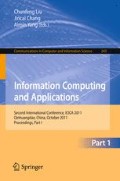Abstract
According to the fuzziness of Each index in Test quality evaluation, The entropy value theory of information will be used to test quality evaluation, use The difficulty, degree of differentiate, believe degree, validity and the standard deviation. As the impact of the test quality evaluation index. Establish a comprehensive evaluation index system, Using the information entropy as evaluation index weight coefficient, which can effectively solve the weight distribution difficulties. Weight is an objectivity, This method is a new test quality evaluation method, and connecting with the example of application, The results show that the method was simple, practical and reliable.
Access this chapter
Tax calculation will be finalised at checkout
Purchases are for personal use only
Preview
Unable to display preview. Download preview PDF.
References
Li, A.G., Zhang, Z.H., et al.: Fuzzy Mathematics and Its Applications, 2nd edn., pp. 165–189. Metallurgical Industry Press, Beijing (2005)
Qu, S.H.: Management decision-making study and application of entropy, pp. 165–189. Machinery Industry Press, Beijing (2001)
Hang, J.M., Mei, C.C., He, X.W.: Fuzzy comprehensive evaluation model based on the quality of the paper evaluation system. Computer Science 31(2), 281–284 (2004)
Kong, L.Y.: Based on rough set theory, a comprehensive evaluation of the quality of papers. Sun Yat-sen University, Guangzhou (2007)
Chen, Q.B., Nie, R.: Based on entropy theory of open-ended investment fund performance evaluation. Business Times (24), 85–86 (2007)
Li, X.Q., Zhen, R.: Based on entropy weight coefficient of evaluation of urban information. Information Science (12), 15–19 (2007)
Li, Y.R.: Comprehensive evaluation for the evaluation of research papers in mathematics college entrance. Hebei University, Baoding (2005)
Wang, J., Zhang, J.S.: ComParing Several Methods of Assuring Weight Vector In Synthetical Evaluation. Journal of Hebei University of Technolojy 30(2), 52–57 (2001)
Yang, K.Y., Wang, L., et al.: Improved entropy fuzzy evaluation model in hydraulic engineering. Water-Saving Irrigation (8), 60–62 (2007)
Negoita, C.V.: Applications of Fuzzy Sets to Systems Analysis. Applied Economics Letters 4, 497–501 (1997)
Author information
Authors and Affiliations
Editor information
Editors and Affiliations
Rights and permissions
Copyright information
© 2011 Springer-Verlag Berlin Heidelberg
About this paper
Cite this paper
Mi, C., Liu, B. (2011). The Research and Application of Fuzzy Entropy Weight Comprehensive Evaluation Method in Paper Quality Evaluation. In: Liu, C., Chang, J., Yang, A. (eds) Information Computing and Applications. ICICA 2011. Communications in Computer and Information Science, vol 243. Springer, Berlin, Heidelberg. https://doi.org/10.1007/978-3-642-27503-6_38
Download citation
DOI: https://doi.org/10.1007/978-3-642-27503-6_38
Publisher Name: Springer, Berlin, Heidelberg
Print ISBN: 978-3-642-27502-9
Online ISBN: 978-3-642-27503-6
eBook Packages: Computer ScienceComputer Science (R0)

